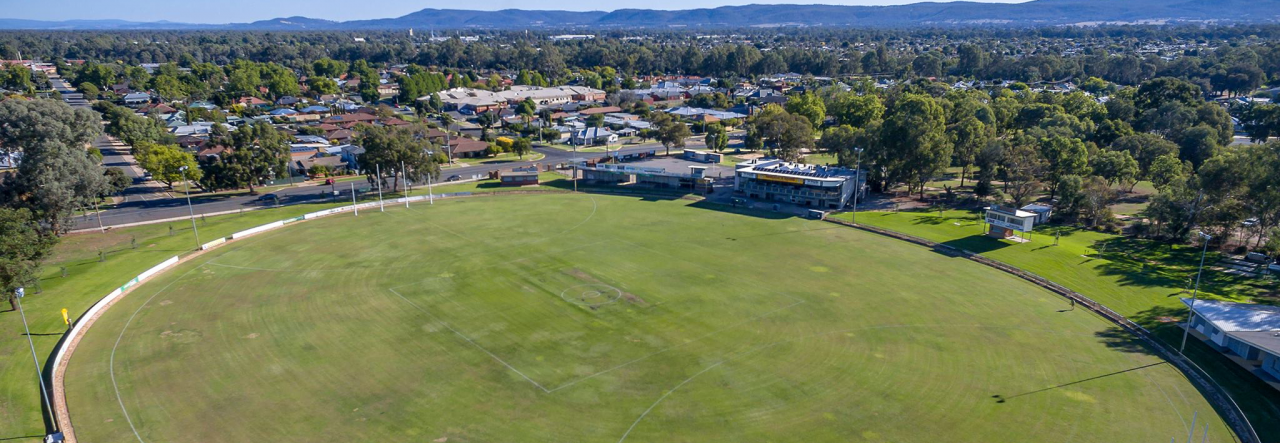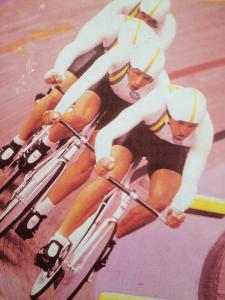Glenn Clarke will always be remembered as the unlucky member of Australia’s 1984 Teams Pursuit cycling team. He was the one who failed to make the final four who won Gold in a stirring finish at the Los Angeles Olympics.
Although he produced a world-class ride in the 50km Points-Score event, to finish 5th, that effort went virtually unnoticed by the general media, who were hungry for medal-winners.
After qualifying for the Points-Score final, the brilliant Clarke was two laps up on the field and a big chance for a medal. However, a break from the bunch was made and he was caught unawares and as sprinters surged further away so did Clarke’s chance of a medal.
Watching the race on video later, Glenn realised that, had he gone with that break-away group, he was in with a real winning chance. He had beaten the Belgian, who took out the Gold in the same event just weeks earlier in Europe.
“Glenn is a far better rider than the Belgian who won it,” coach Charlie Walsh said. “But the Points-Score is very much a race of opportunism and unfortunately, it wasn’t Glenn’s lucky day. The integrity of the boy, no, I mean man, is unbelievable. There are few people who could have been as happy for the Pursuit team’s success as Glenn, whilst still realising it could have been him riding on the team.”
It was later revealed that Clarke had caught a cold in Czechoslovakia and at that stage of their preparation there was no question of having time out to get rid of it. “You have to keep going. So it had no chance to clear up and come selection-decision time I was down a little. That’s the way it goes”, Clarke recalled. He approached coach Walsh and his selectors and told them that he was struggling to contend with his cold at training and suggested they should give Dean Woods the chance to ride.
Clarke’s cycling carer began when he was 11 years-old, delivering papers around the outskirts of Wangaratta. His bike eventually broke down and with the ‘paper-money’ that he had saved be bought a second-hand racing-bike for $65.
His parents – Les (a former football star with Wangaratta Rovers) and Rita, offered the youngster every support and as his potential became obvious he moved to Geelong to live with his coach Pat Shaw – the father of Glenn’s cycling colleague, Dennis. Shaw built a flat for Glenn at his home and supervised his diet, exercises and training regime.
Within 12 months he had been awarded the 1980 Russell Mockridge Oscar, as Victoria’s best all-round cyclist.
Clarke was one of a group of Wangaratta riders who rose to prominence in the early to mid-eighties. Dean and Paul Woods, the veteran Barry Burns, Dean and Damien McDonald and Brendan McAuliffe, were among those who helped put the city on the cycling map.
At 18, Glenn was described by one prominent coach as the ‘ best under-19 rider in the world’. Suddenly, he was spoken of as a potential Olympian. Clarke was one of 22 promising Australian sportsmen to receive a grant, in recognition of their championship potential. It was greatly appreciated by the lad, who had to meet living and training expenses out of his own pocket.
During the following five years, Clarke was at the peak of his success in amateur cycling. LBesides his trip to the ’84 Olympics, he shared Gold at the 1986 Edinburgh Commonwealth Games, with Brett Dutton, Wayne McCarney and Dean Woods, in the 4000m Teams Pursuit. He won Gold at the 100km Madison at the 1985 Australia Games, was a dual 50km Points Score Australian champion and was a member of the Australian amateur cycling team from 1983 to ’86.
His decision to turn professional in 1987 was greeted with shock by cycling officials. “Naturally we are disappointed to lose one of our most gifted and versatile riders “, said national coach Charlie Walsh. “But if we want to hold people we have to offer them something and at the moment we can’t do that.”
Clarke rode for an English team in Europe until 1992, after which he returned to Australia and New Zealand. He was Australian criterium champion in 1988 and won two major cycling events in Britain in 1991.
One of his biggest thrills came when he returned to his home track to take out the Wangaratta Wheelrace in 1990, in front of an adoring crowd.
For Glenn Clarke, it could hardly have been a more fitting way to crown his career.
Clarke took up football umpiring after he was finished with competitive cycling. He was ranked among the best in the area and had charge of several Ovens and Murray Grand Finals. A stroke, suffered ten years ago put paid to his pursuits as a ‘man in white’.
His son, Jackson, a tall, rangy type, is showing signs of developing into a top defender and is approaching his second season with the region’s elite Under-18 football squad, the Murray Bushrangers. Glenn Clarke is still heavily involved in cycling education and coaching. He rates highly among Wangaratta’s greatest-ever sporting achievers.


He won Gold as being a Top Bloke in my books back then!